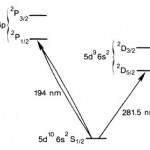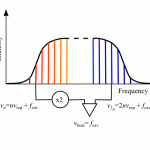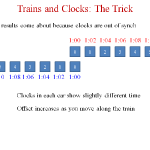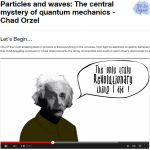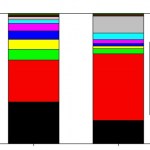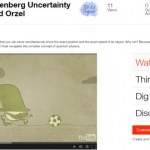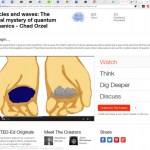
With this morning's announcement of the 2014 Nobel Prizes in Physiology or Medicine, the annual Nobel season is upon us. I didn't do a betting pool post this year, because when I announced last year's winner, I was reminded that I had never paid off the prize to the previous year's winner. So I think I just don't have the time to manage that contest right now...
Anyway, the Physics prize will be announced tomorrow, and while I'm not going to host a contest, I did want to offer some space for speculation about what might win. Unlike last year, when the suspense was mostly about which subset of…
Saturday afternoon, I drove down to the city to see the reunited Afghan Whigs play the Beacon Theater on the Upper West Side. I saw them years and years ago in DC, around 1996 or so on the tour for Black Love, and that was a great show. They've always been one of my favorite bands, so it was great to get another chance to see them live again.
Of course, the passage of 18 years has wrought some changes, most significantly a different lineup for the band. They never had much luck keeping drummers around, but this time they've also lost original guitarist Rick McCollum. This has both good and…
The exciting news of the week: Eureka: Discovering Your Inner Scientist has gotten a starred review in Publishers Weekly. Woo-hoo!
They've said nice things about my previous two books, but getting the star is a big deal. And it's a really good capsule description of the book, with a great pull quote in the last sentence:
This fun, diverse, and accessible look at how science works will convert even the biggest science phobe.
Really, I can't ask for better than that.
I found out this was coming at the end of last week, where it was an absolute life-saver after some sanity-threatening stuff…
Our semi-regular video hangout returns. In this episode, I'm wearing a tie, because I gave the department colloquium this week, and for psychological reasons I always dress up a bit to give talks. This was recorded under an hour after my talk, which probably explains why I'm a little more punchy than usual... I'm not sure what Rhett's excuse is.
Topics include a bunch of failed attempts to walk back an early cheap shot at computer scientists, where Rhett and I rank in terms of Google searches for our first names-- I have to go six pages deep to find myself (I'm on the first page of "Orzel"…
In a weird coincidence, shortly after I wrote a post about "quantum leap" as a metaphor, I was looking up some stuff about John Bell and ran into mentions of a paper he wrote called "Are There Quantum Jumps?" Bell is borrowing a title from Schrödinger, who wrote a pair of articles (really, one article in two pieces) for the British Journal for the Philosophy of Science in 1952 expressing his discontent with the entire idea of "quantum jumps" between states. Bell even opens his paper with a quote from Schrödinger: "If we have to go on with these damned quantum jumps, then I'm sorry that I ever…
Eureka: Discovering Your Inner Scientist has officially been sent to the printers, so we're at the phase of things where I don't have anything to do but think about publicity. There are some reviews forthcoming, at least one of which I'm very happy about, but I'll share more about that when it becomes public. I've also picked up some nice blurbs from very smart folks:
"I know, I know, you think you're just not smart enough to be a scientist. Chad Orzel might convince you otherwise with Eureka. Drawing on basketball, stamp collecting, Angry Birds, Iron Chef, and Antiques Roadshow among his…
Two language-related items crossed in the Information Supercollider today: the first was Tom's commentary on an opinion piece by Robert Crease and Alfred Goldhaber, the second Steven Pinker on the badness of academic writing.
All of them are worth reading, and I only have small dissents to offer here. One is that, unlike Tom and Crease and Goldhaber, I'm actually just fine with the popular usage of "quantum leap" for a particularly dramatic change. Yes, I realize that the canonical "quantum jump" is the smallest possible change, but I think that's putting too much emphasis on only one aspect…
On Twitter Sunday morning, the National Society of Black Physicsts account retweeted this:
Using Lasers to Lock Down #Exoplanet Hunting #Space
http://t.co/0TN4DDo7LF
— ✨The Solar System✨ (@The_SolarSystem) September 28, 2014
I recognized the title as a likely reference to the use of optical frequency combs as calibration sources for spectrometry, which is awesome stuff. Unfortunately, the story at that link is less awesome than awful. It goes on at some length about the astronomy, then dispenses with the physics in two short paragraphs of joking references to scare-quoted jargon from the…
The JCC is closed today for Rosh Hashanah-- and best wishes for a happy new year to those who celebrate it-- so I'm spending the morning with The Pip before Kate comes home to take the afternoon shift while I teach my class. SteelyKid is in school today as usual, so don't tell her, but the Little Dude and I went down to the river to enjoy a beautiful fall day, with trees just starting to turn colors, as you can see in the featured image above.
The highlights for The Pip, though, were the chance to throw rocks in the water, and drum on the pilings along the sides of Lock 7:
The Pip is an…
My Gen Ed relativity course has mostly been me lecturing about stuff to this point, so on Wednesday I decided to shake things up a bit and convert a chapter of David Mermin's It's About Time. The idea was to get students up and moving around a bit, and actually making some measurements of stuff.
Mermin's scenario as adapted for class is this: you have two trains of six cars passing in opposite directions. Each car contains a narrow window through which the other train can be seen, a clock facing the window, and an observer with nothing better to do than note the readings of the clocks in the…
Modern media being what it is, I should get out in front of this, so: I am guilty of putting words in Einstein's mouth. I mean, go watch my TED-Ed video on particles and waves, or just look at the image up top-- that very clearly shows Einstein saying words that he probably never said. And it's my fault.
Well, OK, I didn't actually put those words in his mouth-- the animator did that. What I wrote is "Einstein himself described [the photoelectric effect] as the only truly revolutionary thing he did." Which isn't really a quote, but a paraphrase. And it's really a paraphrase of something…
I get a fair number of books to review, but I'm often pretty bad about writing them up in a timely manner. Of course, most of them are well over 70 pages long, which is why I've managed to turn around Roberto Trotta's The Edge of the Sky: All You Need to Know About the All-There-Is in the course of a weekend.
As you can probably get from the title, this is a book about astronomy written in Up Goer Five style, using only the thousand most common English words (which are helpfully listed near the start of the book, in case you want to check whether he cheated...), plus proper names. And there'…
The AV Club had a Q&A last week asking "What would be your entrance music?" As a music fan and a sports junkie this is, of course, a nearly irresistable question, though a lot of other things got in the way before I could get around to typing up an answer.
I've always kind of thought that Superchunk's "Hyper Enough" would be fantastic entrance music for somebody:
Of course, that somebody wouldn't really be me, as I'm not especially hyper. If I were going to be running out onto a stadium floor for some sporting purpose, I would need something more in line with my actual speed. Maybe a…
My bedtime reading for the past week or so has been Steven Gould's Exo (excerpt at Tor). This is the fourth book in the Jumper series (not counting the movie tie-in novel), and ordinarily wouldn't be worth much of a review, because if you haven't read the first three, this book won't make a lick of sense. If you have read the others, it's a worthy sequel, but three earlier books makes for a lot of backstory to explain in writing the book up.
It's worth noting, though, because it belongs to a sort of unofficial subgenre: books about Working Things Through. The story includes a huge amount of…
After a long absence due to travel (some of which is discussed), Uncertain dots returns!
Rhett and I talk about recent travels, how people going into internet-based physics outreach these days would probably do better to make videos than blog, physics in science fiction, celestial navigation, and as always, our current courses.
Some links:
-- Our Eratosthenes measurement from 2012.
-- Divided by Infinity, the best Many-Worlds story ever.
-- Ted Chiang's "Story of Your Life" isn't legitimately available online, but there's a spoilery Wikipedia page about it.
-- An old post where I talk about…
The London School of Economics has a report on a study of academic refereeing (PDF) that looked at the effect of incentives on referee behavior. They found that both a "social incentive" (posting the time a given referee took to turn around the papers they reviewed on a web site) and a cash incentive ($100 Amazon gift card for meeting a 4-week deadline) worked to increase the chance of a referee accepting a review request, and improved the chances that they would meet the deadline. The effect of cash was a little smaller for tenured faculty, but they were slightly more susceptible to the…
There was a article in Scientific American about diversity in STEM collecting together the best demographic data available about the science and engineering workforce. It's a useful collection of references, and comes with some very pretty graphics, particularly this one, showing the demographic breakdown of the US population compared to the science and engineering fields:
Demographic breakdown of general population vs. science and engineering, from the Scientific American post.
This is a very professionally made graphic, but also misleading in the worst way. When I first looked at this, I…
The second one of the TED-Ed lessons I wrote about quantum physics has now been published: What Is the Heisenberg Uncertainty Principle. This is, again, very similar to stuff I've written before, specifically this old blog post and the relevant chapter of How to Teach [Quantum] Physics to Your Dog.
As usual, I tried but probably failed to do justice to other interpretations in the "Dig Deeper" references I sent; outraged Bohmians should feel free to comment either here or there with better explanations.
Again, it's really fun to see the images the animators found to put to my words. I love…
My TED@NYC adventure last fall didn't turn into an invite to the big TED meeting, but it did lead to a cool opportunity that is another of the very cool developments I've been teasing for a while now: I've written some scripts for lessons to be posted with TED-Ed. The first of these, on particle-wave duality just went live today.
The content here is very similar to my talk last fall, which is, in turn, very similar to Chapter 8 of Eureka: a historical survey of the development of quantum physics. I did the script for this, which was then turned over to professional animators, who did a great…
Steven Pinker has a piece at the New Republic arguing that Ivy League schools ought to weight standardized test scores more heavily in admissions. this has prompted a bunch of tongue-clucking about the failures of the Ivy League from the usual suspects, and a rather heated concurrence from Scott Aaronson. That last finally got me to read the piece, because I had figured I would be happier not reading it, but I wanted to see what got Scott so worked up.
Sadly, my first instinct was correct. It starts off well enough, taking down an earlier anti-Ivy League piece by William Deresiewicz for being…
